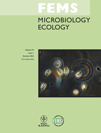PHB-degrading bacteria isolated from the gastrointestinal tract of aquatic animals as protective actors against luminescent vibriosis
Editor: Julian Marchesi
Abstract
The use of poly-β-hydroxybutyrate (PHB) was shown to be successful in increasing the resistance of brine shrimp against pathogenic infections. In this study, we isolated for the first time PHB-degrading bacteria from a gastrointestinal environment. Pure strains of PHB-degrading bacteria were isolated from Siberian sturgeon, European sea bass and giant river prawn. The capability of selected isolates to degrade PHB was confirmed in at least two of three setups: (1) growth in minimal medium containing PHB as the sole carbon (C) source, (2) production of clearing zones on minimal agar containing PHB as the sole C source and (3) degradation of PHB (as determined by HPLC analysis) in 10% Luria–Bertani medium containing PHB. Challenge tests showed that the PHB-degrading activity of the selected isolates increased the survival of brine shrimp larvae challenged to a pathogenic Vibrio campbellii strain by a factor 2–3. Finally, one of the PHB-degrading isolates from sturgeon showed a double biocontrol effect because it was also able to inactivate acylhomoserine lactones, a type of quorum-sensing molecule that regulates the virulence of different pathogenic bacteria. Thus, the combined supplementation of a PHB-degrading bacterium and PHB as a synbioticum provides perspectives for improving the gastrointestinal health of aquatic animals.




